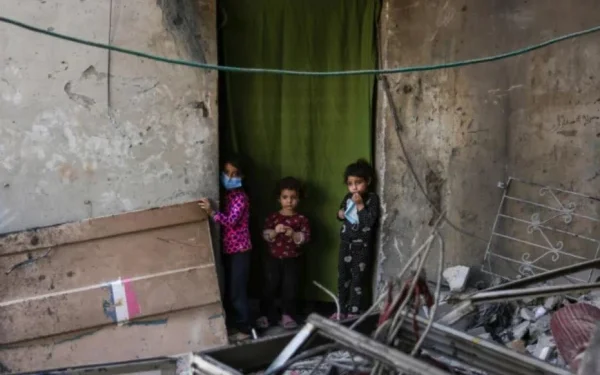A Tragic Morning at the Aid Center
In a harrowing episode that underscores the ongoing humanitarian catastrophe in Gaza, Hussam Wafi, a father of six daughters, was shot dead by Israeli forces as he attempted to collect food from an aid distribution center in Rafah, a city in southern Gaza. The incident has ignited fresh outrage and sorrow across Palestinian communities and prompted renewed scrutiny of Israel’s military actions in the besieged territory.
According to the Palestinian Civil Defense Agency, the attack claimed the lives of 31 people, including Wafi, who had gone to the center accompanied by his brother and nephew in search of flour for his family. The area was crowded with civilians desperate for basic food supplies amid the ongoing siege and severe humanitarian crisis.
A Family Torn Apart
The scene at Nasser Hospital in Khan Younis was filled with grief and anguish as dozens gathered to mourn the loss of Hussam Wafi. His body, lifeless and covered in a white shroud, symbolized the personal tragedies unfolding daily in Gaza.
His mother, Nahla Wafi, speaking through tears, said:
“He went to get bread for his daughters, and he came back a corpse.”
She described him as a devoted father who was doing all he could to support his family amid the spiraling humanitarian crisis. His widow was seen in the hospital courtyard, attempting to console her children, their faces marked with confusion and sorrow. The children, now fatherless, face an uncertain future amid ongoing conflict, scarcity of food, and a lack of security.
The Broader Context: A Worsening Humanitarian Crisis
Blockade and Starvation in Gaza
The death of Hussam Wafi is not an isolated incident but part of a broader pattern of civilian casualties in Gaza since the escalation of hostilities began. The Gaza Strip has been under an Israeli blockade since 2007, a situation that has dramatically deteriorated since the renewed military operations in October 2023.
According to United Nations agencies, over 80% of the population in Gaza now depends on humanitarian assistance to survive. Food, water, electricity, and medical supplies are scarce. Aid convoys are limited, and many distribution centers have been targeted or rendered inoperable due to security concerns or direct attacks.
Mass Displacement and Hunger
The United Nations Relief and Works Agency (UNRWA) reports that more than 1.7 million Palestinians have been internally displaced within Gaza. Many are now sheltering in overcrowded schools, hospitals, or make-shift tents—without access to clean water or reliable food supplies. Rafah, where Hussam Wafi was killed, has been the focal point of recent Israeli military operations and is overwhelmed with displaced civilians.
A growing number of people have died not just from airstrikes, but from hunger, dehydration, and lack of medical care. The death of Hussam Wafi highlights how even routine survival tasks—like getting bread—can become fatal amid conflict.
Allegations of Drone Strikes on Civilians
Palestinian officials allege that the attack on the aid center in Rafah was carried out by an Israeli drone. According to statements from the Palestinian Civil Defense, the drone fired on unarmed civilians who were waiting in line for humanitarian aid, making it a likely violation of international human rights law.
Legal experts and human rights organizations emphasize that attacking civilians or humanitarian aid points may constitute war crimes under the Geneva Conventions. Israel has denied intentionally targeting civilians, stating that its military operations are aimed at neutralizing Hamas combatants. However, the death toll and growing list of civilian victims tell a different story on the ground.
International Reactions and Calls for Accountability
UN Condemnation
The United Nations and various international humanitarian organizations have repeatedly condemned attacks on civilians and aid infrastructure in Gaza. In a recent statement, UN Secretary-General António Guterres said:
“Every life lost in this conflict is a tragedy, and the targeting of civilians is utterly unacceptable.”
International watchdog groups such as Human Rights Watch and Amnesty International have called for independent investigations into the incidents occurring in Rafah and other parts of Gaza.
Mounting Pressure on Israel
Israel is facing increased global pressure to halt its operations in densely populated civilian areas. The International Criminal Court (ICC) has received formal requests to investigate alleged war crimes, including attacks on aid convoys, hospitals, and residential neighborhoods.
Meanwhile, public protests have erupted in major cities around the world, demanding a ceasefire and an end to the blockade of Gaza. Humanitarian aid groups are also urging countries to facilitate more unimpeded access to Gaza for relief efforts.
Lives Lost and Futures Stolen
The story of Hussam Wafi is a painful reminder of the human cost of conflict. He was not a combatant, but a father seeking flour to bake bread for his children. His six daughters now face life without their father, in a home ravaged by fear, hunger, and grief.
As aid workers and hospital staff struggle to respond to daily emergencies, families like the Wafis are being left to navigate a world without basic necessities or emotional support. For many, the hope of peace or even survival grows dimmer by the day.
Conclusion: Humanitarian Urgency in Gaza
The killing of Hussam Wafi while trying to secure food for his daughters reflects the extreme conditions under which Palestinians in Gaza are living. With essential supplies running out and security deteriorating, civilians are increasingly caught in the crossfire.
As the world watches, the urgent need for humanitarian corridors, ceasefire agreements, and international intervention becomes clearer. The loss of one father is a tragedy; the loss of thousands more like him is a humanitarian crisis that demands global action.

























